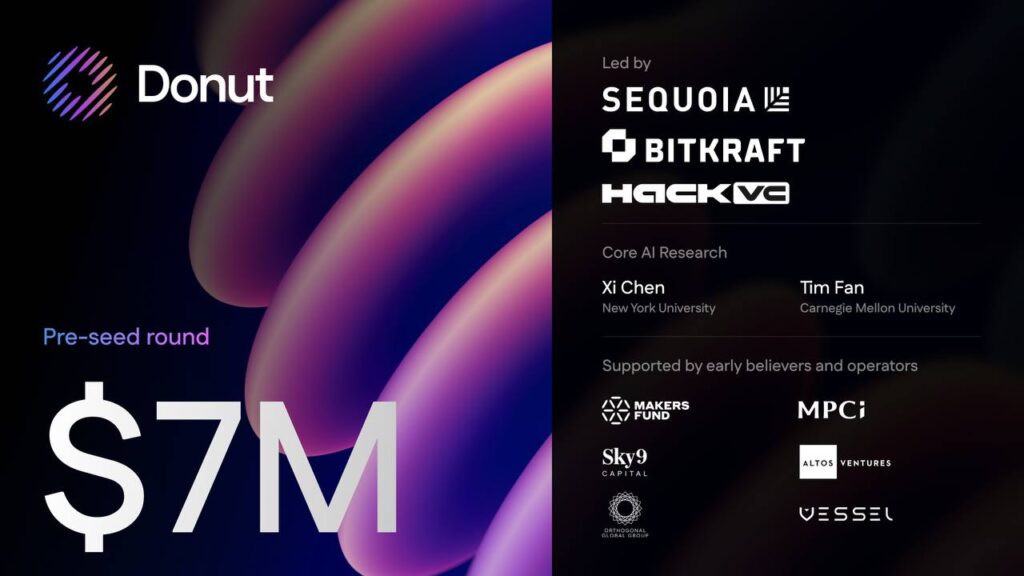New York-based Donut Labs has announced a successful $7 million pre-seed funding round aimed at developing what it claims to be the world’s first “agentic” crypto browser. This innovative tool aims to transform the user experience in interacting with blockchain applications through the integration of artificial intelligence. The funding was led by prominent investors including Sequoia, Bitkraft, and HackVC, along with leading figures from the cryptocurrency ecosystem such as Solana, Matrix Partners, Sky9 Ventures, Makers Fund, and SonicSVM.
Donut’s browser is designed to automate blockchain operations by utilizing AI algorithms that understand both the page context and the user’s intent. Unlike traditional web browsers, which have remained unchanged for decades, Donut seeks to “re-architect” the internet, making it more efficient and suitable for AI agents. According to Donut’s founder and CEO, Chris Zhu, this new approach focuses on creating a hyper-financialized digital experience.
“We’re reconstructing the front end of the internet to be hyper-financialized for AI agents.”
With the $7 million raised, Donut will enhance its browser’s capabilities, including features like a native cryptocurrency wallet and decentralized exchange integration. The tool is designed to allow users to safely execute transactions, trade tokens, and access a range of decentralized services from a single, agent-driven interface. Zhu highlights that the architecture is built to ensure transaction security through isolated environments and AI-powered risk assessments.
As the cryptocurrency landscape evolves, the potential for agentic browsers like Donut to reshape digital interactions is significant. While early adopters will primarily consist of crypto traders and decentralized finance users, the prospect of mainstream adoption looms large within the next decade. Zhu envisions a future where these browsers become the default entry point for internet users, akin to the shift from feature phones to smartphones.
“Agentic browsers are poised to become the default entry point — much like smartphones replaced feature phones.”
Looking ahead, Donut plans to expand its offerings beyond simple transactions to encompass payments, gaming, content creation, and social interactions, all within a singular crypto-native framework. By leveraging advancements in decentralized identity and confidential computing, the company aims to transform the browser into a personal “crypto CFO” for retail users, further integrating the digital asset experience into everyday life.
Donut Labs’ Innovative Crypto Browser Funding
Key points regarding Donut Labs’ newly funded crypto browser are as follows:
- Funding Details:
- Donut Labs has raised $7 million in a pre-seed funding round.
- Funding was led by notable firms such as Sequoia, Bitkraft, and HackVC.
- Notable angel investors include Solana and ecosystem leaders like Matrix Partners.
- Development of Donut:
- The tool aims to create the world’s first “agentic” crypto browser.
- It will integrate a native cryptocurrency wallet and decentralized exchange.
- Donut’s AI algorithms focus on understanding user intent for blockchain operations.
- Enhanced Security and Usability:
- Transactions are secured with AI-powered risk screening and architectural isolation.
- AI translates complex blockchain data into easily understandable formats.
- Users can perform tasks like trading or earning passive yield seamlessly.
- Future of Agentic Browsers:
- Potential mainstream adoption within the next decade, transforming how users interact online.
- Agentic capabilities may lead to decreased costs in Ethereum layer-2 networks.
- Expected widespread functionality to merge onchain and offchain environments.
- Long-term Vision:
- Donut aims to become a comprehensive platform for payments, gaming, and social interactions.
- Plans to utilize decentralized identity and confidential computing technologies.
- A long-term goal is to turn the browser into a personal “crypto CFO” for users.
“Agentic browsers are poised to become the default entry point for the internet.” – Chris Zhu
Donut Labs Revolutionizes Crypto Browsing with AI Integration
Donut Labs’ recent funding round positions it as a potential game-changer in the rapidly evolving crypto space. With a hefty $7 million in pre-seed capital from notable investors like Sequoia and Bitkraft, the company is stepping into the spotlight with its “agentic” crypto browser. Unlike conventional web browsers, this innovative platform promises to enhance user interaction with blockchain applications through powerful AI algorithms that understand context and intent. With features such as a native cryptocurrency wallet and seamless integration with decentralized exchanges, Donut aims to create a centralized access point for varied crypto services.
Comparatively, existing platforms in the market, such as traditional crypto wallets and decentralized applications, often fall short when it comes to user experience and operational efficiency. Donut’s AI-driven ecosystem, which includes advanced risk screening and transaction safety measures, offers a significant edge. While similar tools emphasize security and decentralization, they lack the intuitive interface and intelligent transaction execution that Donut proposes. This advantage could draw a significant user base from DIY traders to casual crypto enthusiasts looking for a simplified experience.
However, the expectations for such technology are a double-edged sword. The reliance on artificial intelligence could introduce complexities that may deter less tech-savvy users, creating a barrier for entry. Additionally, with the pace of technological advancements, competitors may quickly adapt to integrate AI into their own platforms, potentially diminishing Donut’s first-mover advantage. Furthermore, there is the inherent risk associated with new software that could result in security vulnerabilities, leaving early adopters exposed.
The target audience for Donut includes crypto traders, decentralized finance (DeFi) users, and tech-savvy individuals looking for innovative financial solutions. However, should the technology fail to deliver a seamless experience, it may push users back to familiar platforms, stalling potential market growth. The onset of agentic browsers could also create friction for traditional web browsers, compelling them to innovate or risk obsolescence in a landscape that is gradually veering towards hyper-financialization and artificial intelligence.

















